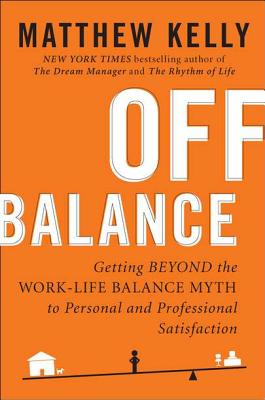The Myth of Work-Life Balance
When was the first time you heard that phrase: work-life balance? Initially, I remember it coming up primarily in discussions about women and the tough choices they make to balance their responsibilities and desires as mothers with the demands of their careers. So maybe the early 1990s?
When was the first time you heard that phrase: work-life balance? Initially, I remember it coming up primarily in discussions about women and the tough choices they make to balance their responsibilities and desires as mothers with the demands of their careers. So maybe the early 1990s? Wikipedia tells me that the phrase was used in the UK in the '70s and in the US in the '80s. In any case, it's a relatively new description to an eternal conundrum. The relationship between our personal lives and our professional lives is a complex one. Some of us do our work from our houses, our children playing just outside the office door. Some of us hustle our kids off to school just before we hustle off to our jobs. Some of us work 60 hours a week in order to take that month-long trip to Italy each year. Some of us work as primary caregivers. Some of us punch in and punch out knowing we'd stay punched out if only we didn't have so many bills to pay and mouths to feed. The thing about any of these scenarios is that none of these options are indicative of balance. Each of these requires sacrifice at one time or another. Bestselling author of the fantastic The Dream Manager, Matthew Kelly, would agree. In his new book, Off Balance, Kelly declares work-life balance a myth. A myth we have all been chasing for a quarter-century or more. "Most people don't want to hear this, and certainly our culture tells us incessantly that we can have it all, but the truth is, you can't. You cannot be in two places at one time, you cannot have it all, and so you must choose." Not only does Kelly think that work-life balance is unachievable, so we've been engaged in this sort of Sisyphean struggle, he thinks that balance isn't even what we want or need. Instead, he submits, in whatever we choose, satisfaction should be our ultimate goal. (Ear worm alert: I can't help singing a modified version of the Rolling Stones' "Satisfaction": "I can't get no, work-life balance. But I try and I try...." Ok, back to business.) In Off Balance, Kelly argues that work-life balance has been beyond our reach for a number of reasons. First, work-life balance is inherently flawed because it diametrically opposes the two essentials aspects of our lives that are intrinsically intertwined. "[Y]ou do not have two lives, one personal and one professional." Additionally, no system was ever put in place to help people achieve it. "Systems drive behaviors. Certain behaviors lead to certain outcomes. If you know what outcome you desire, the next step is to identify what type of behaviors will produce that outcome." But balance, as an outcome, might not ever be achieved because the "urgent" is always there to wreck your well-laid plans. So instead of searching for balance, Kelly advises that you assess your life in terms of satisfaction, and then implement the system he proposes in this book to help improve the level of satisfaction in your life. Written clearly and concisely, Kelly clearly has a love for the topic, has put his theory into personal practice, and can help you achieve a more satisfying life. Satisfaction trumps balance, he says, because satisfaction is a value structure, is "the contentment and fulfillment that arise from the gratification of needs and desires." Satisfaction is not about getting everything you want. He makes clear there is a difference between pleasure vs actual satisfaction, and it's a provocative and convincing point:
"Pleasure cannot be sustained beyond the activity producing it." "Satisfaction can be sustained beyond the activity producing it.""Those [things] that only bring pleasure to my life leave me with an unquenchable yearning for more of the same....In many ways we have become addicted to pleasure, to getting what we want, and the cost is always genuine satisfaction." He believes that we can be more disciplined and deliberate in how we choose to live our lives. In fact, he encourages us to live our lives strategically, applying a systems approach that he outlines in the second half of the book. "A good system is the connection between good behaviors and good outcomes." Kelly presents five facets to establishing a system for satisfaction and how to implement them:
Assessment Priorities Core Habits Weekly Strategy Session Quarterly ReviewSound a bit like how you go about your work at the office? Well, it's not all that different--and that's not a bad thing, Kelly says. It's all about getting the most out of ourselves whether we are producing measurable goals at work or are becoming the best version of ourselves in the big picture. In fact, if we take what we know about setting measurable goals in the workplace and apply that knowledge to our lives, there is also a commensurate benefit to doing this for the workplace. "The future of an organization and the potential of its employees are intertwined; their destinies are linked. An organization can only become the-best-version-of-itself to the extent that the people who drive that organization are becoming better-versions-of-themselves." If you have enjoyed reading such books as Well-Being by Gallup/Tom Rath, How Full is Your Bucket by Tom Rath, Drive by Dan Pink, and The Happiness Advantage by Shawn Achor, you'll be very pleased by the straight-forward and pragmatic advice found in Off Balance, available September 15th.




